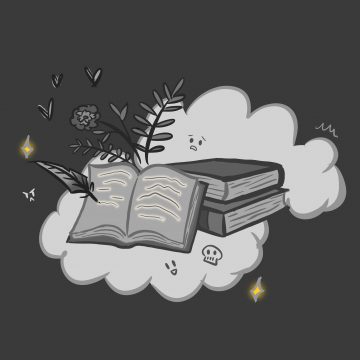Celebrating Poetry Month
It is with a happy heart that I welcome you all back to “The Book Club” after a rather lengthy hiatus. Never fear, my dear readers, for in my time away you can be sure I have read many new books that I can now share with you all! To start off this brief revival, and in honor of National Poetry Month, I will be recommending some poetry novels for anyone to enjoy, whether you’re an inexperienced poet or a poetry snob.
For those that are potentially dipping their toe into modern poetry for the first time, I would steer you towards “Island Weather” by Chelsea Tadeyeske, who is one of the operators of Pitymilk press. This is a chapbook, which is commonly designed as a short collection of printed poems or stories, that you can order from their website. Tadeyeske’s work reads as a blend of intimate, intrusive thoughts and graphic — and sometimes grotesque — imagery that never fails to fascinate and bewilder. One of my favorite poems in the collection is “Cuticle,” and honestly? I wouldn’t know an adequate way to describe its contents to do it justice. It’s a poem of existence and awareness, told through the vivid imagery of consumed cuticles and celebrated human eggs on display. Tadeyeske has a methodology of being blunt in her work, which is a skill more evident in her live performances. I have had the joy of attending two of her local performances, and her voice has a frank, dreamy quality when she speaks to the audience, allowing for her poem to be a loose train of thought shared between friends rather than simply a rehearsed speech.
If you want a poetry collection that you can sink your teeth into and chew on for a while, I’d recommend Paul Tran’s “All The Flowers Kneeling.” They draw their inspiration from a cornucopia of references, layering the sand-dusted tales of “1001 Arabian Nights” with lipstick-smeared stories of abuse, generational legacies and scientific discoveries. One of my favorite poems of theirs is “Hypothesis,” which uses the relationship between moths and light to discuss how the narrator is slowly consumed by an overwhelming flood of people — abusers, lovers, however you’d want to label them. I personally feel as though Tran’s poetry is often more impactful when they perform live, as they tend to incorporate a significant amount of flair and charisma into their performance. The audience is left hooked onto every pause, fan movement, bared grin, as it is all intentional for the show.
If neither of these poets speak to you, then you can always choose to start your poetic journey with poets that are closer to home, or rather, to campus. Associate Professor of English Melissa Range has two published poetry collections, entitled “Scriptorium” and “Horse and Rider,” and she primarily focuses on the complicated relationships between religion and the surrounding violence, natural wonders and history. Meanwhile, Assistant Professor of English Charles Austin Segrest has one collection, entitled “Door to Remain,” with a second on the way, and he often writes about growing up with absent parents and the man that stems from such a childhood.
While poetry is often a complicated genre for one to get into, it truly boils down to finding a collection that speaks to you. Maybe the author discusses difficult topics you can relate to, or maybe the words are simply pretty; everyone has a different reason for choosing the collections they add to their library. I hope one of these spoke to you, but if not, then don’t give up looking for one that does if poetry is truly something you’d like to incorporate more into your life. Until next edition, I wish you all happy reading — whether it’s poetry or not!

